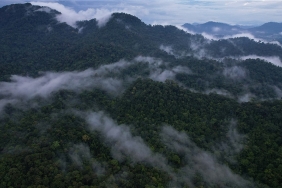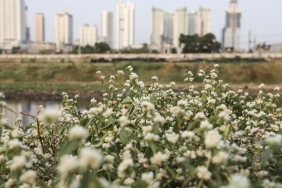INDONESIAN STAKEHOLDERS SAY: GREEN INVESTMENTS ARE PROFITABLE
Jakarta (29/02)-Indonesia has paved a way in finding profitable solutions on green investments as The Ministry of Agriculture, the European Union Delegation to Indonesia, United Kingdom Department of International Development and WWF Indonesia sit together and register what incentives would make the most contribution to the economy and to environmental sustainability.
""Sustainable agriculture is a priority for Indonesia. Government decree of 9 January 2012 on 'Incentives for agricultural land production for sustainable agriculture' underlines the firm commitment to see the agriculture sector lead Indonesia's sustainability commitment. It is also a priority for us to support a sustainable agriculture model and investment for small farmers in rural areas,"" said Vice-Minister of Agriculture Rusman Heriawan.
By 2015, it is projected that the global demand of palm oil will rise from only 45 million tons in 2010 to 62-64 million in 2015. Most of the needs will continue to be supplied by Indonesia’s growing palm oil industry.
Many Indonesian companies are striving to improve their sustainability practices. Good corporate practices by these companies are promoting a change across the industry. At the same time however, critical views on Indonesian palm oil in relation to the environmental damages imposed by the sector continue to spread.
Good practices adopted by leading companies are shown to be good for business. Whether it is in terms of image and consumer confidence, and hence access to the market, such as commitment to low carbon planting, or in terms of real cost savings for operations, such as Musim Mas's methane capture experience. However, there is still a perception that environmental investments are a cost rather than an opportunity. Better understanding of these opportunities is needed.
Palm oil producers may need support from the government to make further progress and overcome those challenges. A strong incentives policy by the government for the producers, traders, retailers and consumers of the sustainable certified palm oil products could be a determining factor to enable and speed up change.
The stakeholders of this Conference, which brings together representatives from government ministries, business and civil society, jointly state that environmental investments, contrarily to what is commonly perceived, are in fact good for business. The parties are committed to work together as partners in sustainability and to follow up on the incentives discussed. The Ministry of Agriculture's Sustainable Agri-Business Task Force has been set up for this purpose.
""Today I participated in the most constructive debate between industry, civil society and government on the issue of CPO that I have witnessed in my three years in Indonesia"", said H.E Ambassador Julian Wilson.
""CPO is a great industry for Indonesia. Also Europe likes the palm oil product - we are one of your largest markets. But we all recognise there are environmental impacts from the industry. So today we explored examples of how industry can flourish while also addressing these environmental concerns. For example, we heard today of companies who are capturing methane from palm oil processing and, as a result, saving money on their electricity bills while also cutting green house gas emissions. We hope Indonesia CPO industry can upscale these examples, and green their industry while maintaining their profitability"", he added.
Support to this joint effort also comes from Kadin, whose representative, Ibu Shinta Kadmaniunderlines that ""The Indonesian business community sees the huge opportunity of green investments. We welcome government support for Indonesian businesses to make the transition.” With support from government and civil society it is foreseen that a huge transition will take place which will secure Indonesia's place as one of the largest economies in the world.
At the same time, Dr. Efransjah, CEO of WWF-Indonesia, states that ""WWF supports government to invest in enabling policies to incentivize the value chains of primary agriculture commodities to move towards sustainability. This will in turn help the government mitigate unforeseeable social and environmental costs. WWF-Indonesia is encouraged to take active role in working with government, business leaders, and other stakeholders to safeguard the economic values of the commodities for the country by internalizing ennvironmentally and socially beneficial practices on the ground.""
Contact person for WWF:
Irwan Gunawan, Deputy Director Market Transformation, WWF-Indonesia, igunawan@wwf.or.id




